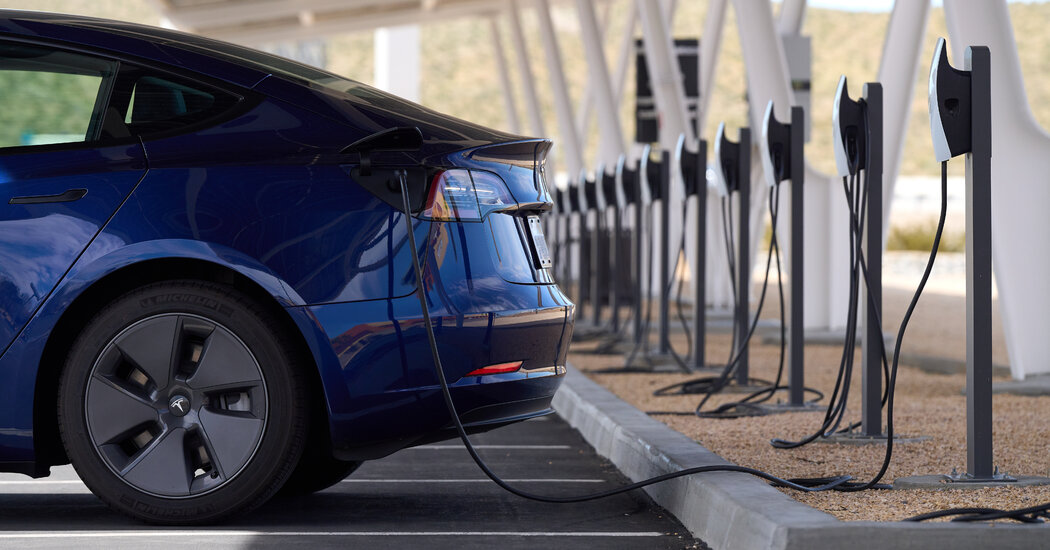Tesla’s once-dominant market share for electric vehicles in the United States fell below 50 percent in the second quarter of the year, even as sales of battery-powered cars surged to a record high, according to new estimates published Tuesday by a research firm.
Tesla accounted for 49.7 percent of electric vehicle sales in April through June, down from 59.3 percent a year earlier, as the Elon Musk-led company lost ground to General Motors, Ford Motor, Hyundai and Kia, according to research firm Cox Automotive. It was the first time the company’s market share fell below 50 percent in a quarter, Cox said. The firm, a leading researcher in the auto industry, estimates market share based on registrations, company reports and other data.
The numbers are the latest sign that Tesla is losing its dominance in a market it essentially created in 2012 when it introduced the Model S sedan. Before that car, very few electric vehicles were sold in the United States in any given year.
Overall, U.S. electric vehicle sales rose 11.3 percent from a year earlier, suggesting consumer demand for the technology remains healthy even if sales are no longer growing at more than 40 percent a year as they did last year. Americans bought or leased more than 330,000 electric cars and light trucks during the quarter, accounting for 8 percent of all new cars sold or leased in the three-month period. A year earlier, electric vehicles accounted for 7.2 percent of the market, Cox said.
A few years ago, Tesla didn’t have many competitors, and virtually no other company could match the range of its cars on a full charge or acceleration. But established automakers have introduced electric vehicles that can travel 300 miles or more, matching and sometimes exceeding the capabilities of Tesla’s cars.
According to a separate report, there are more than 100 electric models available in the United States. report published Tuesday by the Alliance for Automotive Innovation, an industry group. Prices have fallen because the supply and variety of models have increased, allowing more people to afford one.
Intense competition “is leading to continued pricing pressure, which is slowing the pace of EV adoption,” Stephanie Valdez Streaty, director of industry insights at Cox, said in a statement.
Many consumers now buy electric cars from established automakers like BMW or Ford, which have large dealer networks that can provide maintenance and repairs. Tesla sells cars online, and many consumers have said it can be difficult to get their cars fixed at the company’s relatively small network of service centers.
Tesla’s sales have also suffered from an aging lineup. Its best-selling vehicle, the Model Y, sold out in 2020, making it dated by industry standards. Hyundai and sister company Kia offer more electric models than Tesla, with competitive pricing and newer designs.
After a slow start over the past few years, GM has recently begun rolling out vehicles designed to be electric, rather than models converted from gasoline cars. The company is also now using batteries made in the United States in a joint venture with LG Energy Solution. GM is expected to begin selling an electric version of GM’s Chevrolet Equinox sport utility vehicle within the next few months for about $35,000 before factoring in a $7,500 federal tax deduction.
Tesla said last week that global sales fell 4.8 percent to about 444,000 in the second quarter from the same period a year ago. The company doesn’t break out sales by country, but Cox estimates Tesla’s U.S. sales fell 6.3 percent in the second quarter to 175,000 vehicles.
Musk may also have hurt Tesla’s sales with his embrace of right-wing politics on X, the social media platform he owns. Electric vehicle owners tend to be liberal or left-leaning, and electric vehicle sales are highest in states that tend to elect Democrats to state and federal office.
Sales of electric vehicles haven’t grown as quickly as some automakers had expected in recent quarters, but the market is still growing faster than that of gasoline vehicles. The market for hybrid vehicles has been growing even faster than that of all-electric vehicles recently; hybrids, which don’t need to be plugged in, allow consumers to avoid a patchy national public charging network.
Not all automakers are benefiting. Electric models including Mercedes-Benz, Polestar, Porsche and Volvo fell in the second quarter from a year earlier, Cox said. The company said it would report detailed sales and market share figures on Thursday.


